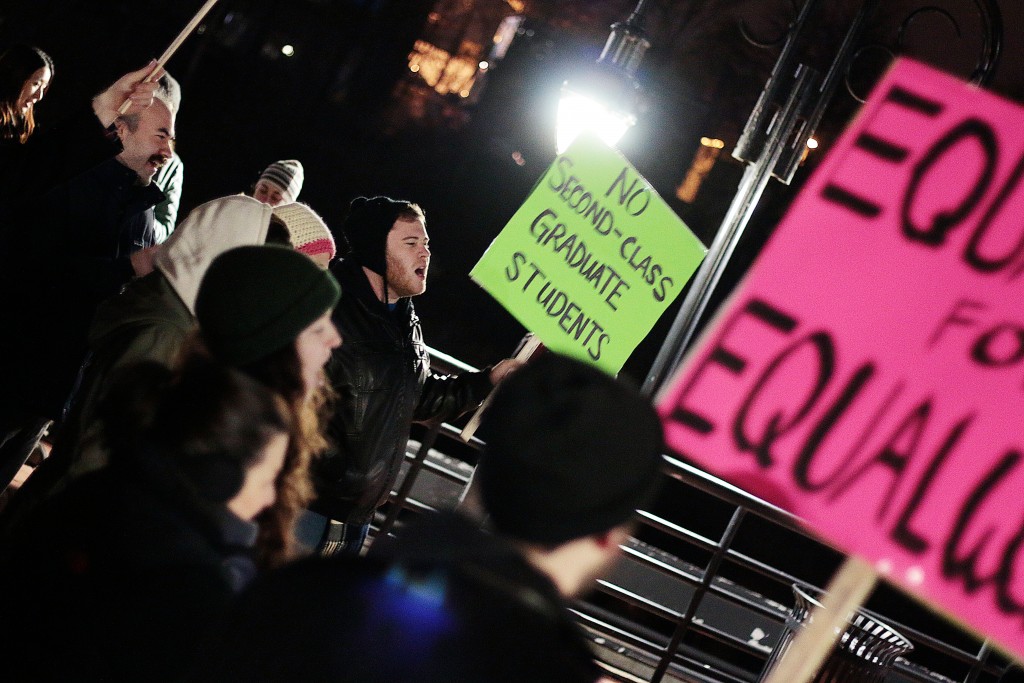
With picket signs, megaphones and children on shoulders, graduate students took to the streets of Downtown Binghamton on Friday evening to protest recent graduate student stipend changes.
Members of the Graduate Students Employees Union (GSEU) and Binghamton University’s Graduate Student Organization (GSO) gathered around the Peacemaker Stage on Court Street to protest the BU administration’s decision to increase stipends for incoming graduate students. The increases will only benefit those entering BU beginning in the Fall 2016 semester, while current graduate students will maintain the same pay rate.
According to Laura Johnsen, a second-year Ph.D. candidate studying anthropology and one of the organizers of the protest, those incoming graduate students are expected to make anywhere from $3,000 to $7,000 more than current graduate students annually. Currently, graduate students make an average of $14,500 per year, but it can vary across disciplines.
“We would like to see equal pay for equal work,” Johnsen said. “We want the same stipends as the incoming graduate students.”
The protest moved from the Peacemaker Stage and headed down Water Street. Interrupting traffic while crossing streets and grabbing the attention of restaurant patrons, the march moved toward State Street then back toward Court Street and concluded at the stage.
Last week, a similar protest took place on campus. Graduate students gathered in front of Glenn G. Bartle Library and marched around campus before reaching the Couper Administration building to deliver new proposals.
Johnsen said the reactions given from the administration were not what the GSEU and GSO had hoped for, and they wanted Friday’s march to put more pressure on the administration and bring more attention to the issue.
“What it did was it opened the door to start talking with the administration,” she said. “However, they keep telling us the stipend increases for us are off the table.”
Johnsen said the administration offered concessions including summer funding for graduate students and an increased funding for conference travel. Although she said this would help, it’s not enough to solve the problem.
Rally participant Katie Seeber, a second-year Ph.D. candidate studying anthropology, said that although equal pay for the same amount of work is the main issue, she is also concerned that students with increased pay will have more opportunities to present research and network.
“If we’re competing with these students for the same jobs we’re going to be at a disadvantage, when we can’t afford to do that networking, that research presentation or go to conferences, while those students can,” Seeber said. “That’s something that the administration is really not understanding about our arguments.”
The protest was held Downtown partly to show the effects stipends have on the community, such as less money being filtered into the local economy. Increased pay could encourage graduate students to spend more on going out to eat, going grocery shopping, supporting local businesses and fully taking advantage of what the community has to offer.
“There is the issue of spending power. If they are going to increase money that some students have, those students are able to give more money to the community, whereas we won’t be able to do that,” said Katherine Lacy, a second-year Ph.D. candidate studying anthropology. “Having a university that values students differently doesn’t make for a good university, which is not good for the community.”
Seeber said that this protest was to show the administration that the unhappy graduate students are not going anywhere, and she expects the protesting to continue in the near future.
“It’s a way to show the administration that we’re not backing down from this,” Seeber said. “We appreciate them meeting us, but their unwillingness to compromise or find solutions that help all students instead of only a specific segment of students is not okay with us.”


